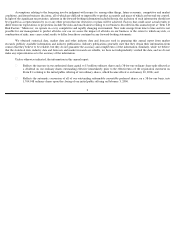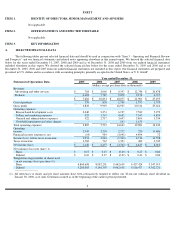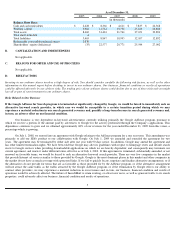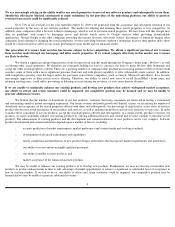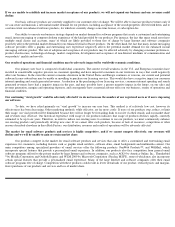Incredimail 2009 Annual Report Download - page 16
Download and view the complete annual report
Please find page 16 of the 2009 Incredimail annual report below. You can navigate through the pages in the report by either clicking on the pages listed below, or by using the keyword search tool below to find specific information within the annual report.
More individuals are using non-PC devices to access the Internet, and our online services may not be accepted by such users.
The number of individuals who access the Internet through
devices other then personal computers, such as mobile phones, has
increased dramatically. Our products were designed for rich, graphic environments such as those available on desktop and laptop computers. The
lower resolution, often slower communication, functionality and memory associated with alternative devices currently available may make the
use of our products through these devices difficult. If consumers find our products difficult to access, we may fail to capture a sufficient share of
an increasingly important portion of the market for online services and may fail to attract advertisers and web traffic.
Exchange rate fluctuations may decrease our earnings if we are not able to hedge our currency exchange risks effectively.
A majority of our revenues are denominated in U.S. dollars. However, most of our costs, mainly personnel expenses, are incurred in
New Israeli Shekels (NIS). Inflation in Israel may have the effect of increasing the U.S. dollar cost of our operations in Israel. If the U.S. dollar
declines in value in relation to the New Israeli Shekel, it will become more expensive for us to fund our operations in Israel. A revaluation of one
percent of the NIS as compared to the U.S. dollar could reduce our income before taxes by approximately $0.1 million. During 2007 the
exchange rate of the U.S. dollar to the New Israeli Shekel decreased, as well as in the first half of 2008. This
trend reversed in the second half of
2008 and fluctuated significantly through 2009.
In addition, a significant portion of our sales is in currencies other than the U.S. dollar. In 2009, approximately 14% of our revenue was
in these currencies. To the extent such sales are not immediately exchanged for US dollars, we bear a foreign currency fluctuation risk. As of
December 31, 2009, we had a net foreign currency net asset of approximately $1.6 million and our total foreign exchange income was
approximately $12 thousand for the year ended December 31, 2009. In addition, in territories where our prices are based on local currencies,
fluctuations in the dollar exchange rate could affect our gross profit margin. To assist us in hedging the risks associated with fluctuations in
currency exchange rates, we have contracted a consultant proficient in this area, and are implementing his proposals. However, due to the market
conditions, volatility and other factors, his proposals occasionally prove to be ineffective or harmful, and the implementation of his proposals
ineffective. We may incur losses from unfavorable fluctuations in foreign currency exchange rates. See “
Item 11 Quantitative and Qualitative
Disclosure of Market Risks” for further discussion of the effects of exchange rate fluctuations on earnings.
A loss of the services of our senior management and other key personnel could adversely affect execution of our business strategy.
We depend on the continued services of our senior management, particularly Ofer Adler, our Chief Executive Officer, Chief Product
Officer and co-
founder. Our business and operations to date have been mainly implemented under the direction of our current senior
management. The loss of the services of these personnel could create a gap in management and could result in the loss of management and
technical expertise necessary for us to execute our business strategy and thereby adversely affect execution of our business strategy. Although
we have obtained “key person” life insurance on the life of Ofer Adler in the amount of $1.5 million, we do not expect to obtain “key person”
life insurance with respect to our other officers.
Further, our ability to execute our business strategy also depends on our ability to continue to attract, retain and motivate qualified and
skilled technical and creative personnel and skilled management, marketing and sales personnel. If we cannot attract and retain additional key
employees or lose one or more of our current key employees, our ability to develop or market our products could be adversely affected. See
“Item 6 Directors, Senior Management and Employees.”
Under current U.S. and Israeli law, we may not be able to enforce covenants not to compete and, therefore, may be unable to prevent
our competitors from benefiting from the expertise of some of our former employees.
We have entered into non-
competition agreements with all of our professional employees. These agreements prohibit our employees, if
they cease working for us, from competing directly with us or working for our competitors for a limited period. Under current U.S. and Israeli
law, we may be unable to enforce these agreements, in whole or in part, and it may be difficult for us to restrict our competitors from gaining the
expertise that our former employees gained while working for us. For example, Israeli courts have required employers seeking to enforce non-
compete undertakings of a former employee to demonstrate that the competitive activities of the former employee will harm one of a limited
number of material interests of the employer which have been recognized by the courts, such as the secrecy of a company’
s confidential
commercial information or its intellectual property. If we cannot demonstrate that harm would be caused to us, we may be unable to prevent our
competitors from benefiting from the expertise of our former employees.
12


